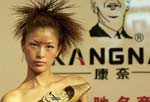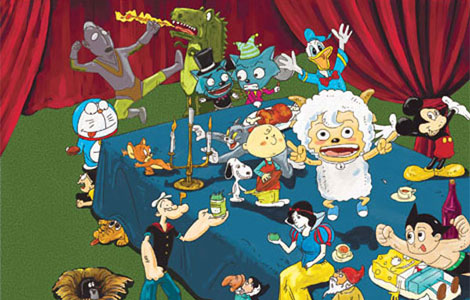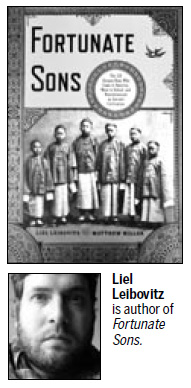Prime
Chinese students in US - 150 years ago
Updated: 2011-04-01 11:27
By Chen Weihua (China Daily)
|
|
NEW YORK - It was on a trans-Siberia train from Beijing to St Petersburg in 2006 when Liel Leibovitz and his wife first saw photographs on TV of young Chinese boys, wearing silk robes and long ponytails, standing on Yale University campus, in the 1870s.
Leibovitz, who now teaches science communication at New York University, could not believe that the Chinese were studying in Yale as early as the 19th century.
He went online immediately and discovered a fascinating story, now told in his latest book Fortunate Sons - the 120 Chinese boys who came to America, went to school, and revolutionized an ancient civilization.
In 2008 and 2009, Leibovitz and his writing partner Matthew Miller visited Guangdong, Beijing, Hong Kong and other places to trace the boys.
Many of these students became prominent figures of the nation, shaping its economy, military, diplomacy and government.
The pair also visited Connecticut and other areas in New England where the boys had lived, played and studied. They spent weeks reading diaries, letters and journals and were amazed to see collections of the boys' clothing, hair and slippers, all well kept.
For someone who had been learning about China for only a few years, the authors have woven very well the boys' story into that complex yet important part of Chinese history.
Not only does the book tell a gripping story of a quest for education, but it recreates the environment in which the Chinese lived in the United States 150 years ago.
In the 1870s, the teetering Qing Dynasty (1644-1911) was struggling to cope with domestic rebellion and foreign invasion.
The surprising rise of the once peripheral Japan and concessions forced upon by the British and French, who enjoyed extraterritoriality, made top officials of the Qing court deeply worried, while realizing the need to reform and learn from the West.
So when Yung Wing - who at 19 followed an American priest to the US in 1847 and became the first Chinese to graduate from Yale University in 1854 - proposed in 1868 to send young Chinese to study in the US, the imperial court said yes.
Before then, the Middle Kingdom long believed it had nothing to learn from the outside world.
Over four years from 1872, the Qing court sent 120 boys aged between 12 and 15 to the US in a fully government-funded program, aiming to let each study there for up to 15 years, from prep school to college.
The boys, arriving in Hartford, Connecticut, where many host families were waiting, were well received by the locals.
"These boys were in the heart of America in those days," said Leibovitz, citing Mark Twain who lived in and praised Hartford by saying. "If you have ever seen Hartford, you never want to see another American town."
The boys adapted well to the local life, learning English, horse riding and even hunting. Some soon became bored with the Confucian classes they had to take once a month at the Chinese Educational Mission.
In 1876, the boys were invited to observe Philadelphia's Centennial Exhibition, better known today as World Expo. They were captivated by new technologies such as the telegraph, and even met then US president Ulysses Grant there.
But while the boys were in New England, riots and lynchings against Chinese started in San Francisco.
This anti-Chinese fervor and the Qing court's worry that the boys were becoming too Westernized led to a decision to bring the students back to China in 1881.
A year after the boys returned, the Chinese Exclusion Act was passed in the US, making the period described by Leibovitz as "one of the most shameful moments in American history".
"The boys always felt a little foreign in America," Leibovitz said after reading the diaries of some of the Chinese boys, written in English. Leibovitz, an Israeli who came to the US a decade ago at age of 22, said he understood that feeling well.
The students, returning to China as men, felt they were not entirely Chinese either. However, they felt the heavy responsibility on their shoulders for the nation. Most of them had a reformist, rather than a revolutionary mind.
Two of the top Qing court officials, Zeng Guofan and Li Hongzhang, who have been very much resurrected in China in recent years, were described vividly in the book. Both played crucial roles in China's modernization as well as in the boys' study abroad mission.
Leibovitz has also written at length of the life of Yung, the once-braided and robed initiator of the study mission, by referring to his autobiography My Life in China and America.
And one of the more interesting tidbits: Yung once scored a touchdown at Yale to win a game for the freshmen against the sophomores.
When visiting the Yung Wing School in Zhuhai in southern China, Leibovitz said he felt a direct connection between Yung and today's students, who were carrying out art projects and displaying super computer skills.
Leibovitz said he and Miller hope the book would give the average American an insight into China in the late 19th and early 20th century to understand where modern China came from.
Sitting in a caf in Beijing in 2009, the two authors asked themselves whether the story would have a happy or tragic ending.
"Our conclusion is that it hasn't ended yet," Leibovitz said. "The struggle they had to undergo is the struggle we have to undergo today to understand each other.
"It's the struggle every Chinese and every American has to go through if we truly want to make this cooperation work.
"It's the challenge we have to face each time when racism and ignorance on either side of the ocean occurs.
"The story has not ended yet. The story continues."
Leibovitz said several of his students from NYU are planning to spend the next semester in China.
"This is how you overcome challenge and how you build relationship between the two countries," he said.
"This is the real legacy of these 120 students."
China Daily
Specials

Share your China stories!
Foreign readers are invited to share your China stories.

Fill dad's shoes
Daughter and son are beginning to take over the family business of making shoes.

Have you any wool?
The new stars of Chinese animation are edging out old childhood icons like Mickey Mouse and Hello Kitty.
